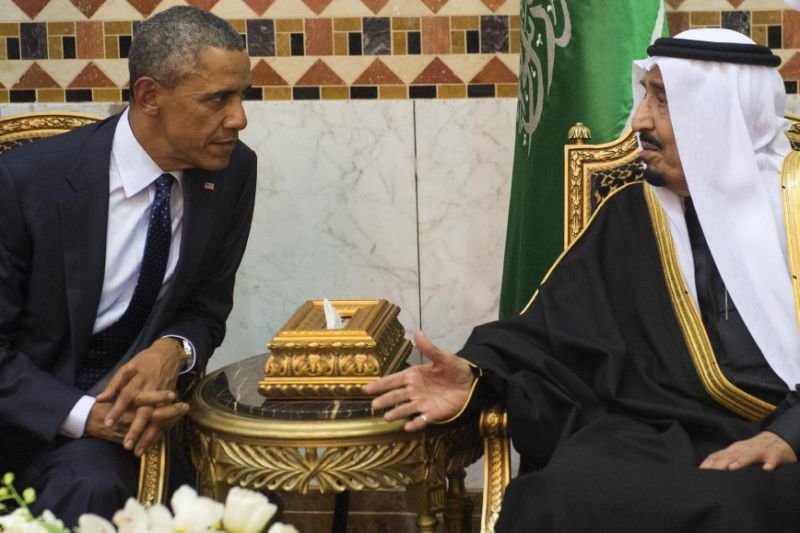U.S.-Saudi ties: No longer the same

President Obama’s recent trip to Saudi Arabia was about nothing more than an ardent attempt to reassure the Saudis that the United States wishes to support their efforts to maintain regional and domestic stability. However, partly because of his stated personal convictions that the Saudis have acted as “free riders” in the region under the U.S. security umbrella, and in part because of the pressure from the U.S. Congress to divulge the Saudis’ alleged involvement (in terms of funding and ideological support) in the 9/11 attacks on the United States, the nature of this visit as well as the president’s message/mission sharply contrasted with the cordial nature of his previous meetings.
Two questions remain: (1) why the 9/11 attacks have suddenly become a contemporary issue? And (2) what explains the motivations of U.S. senators to place the Saudi regime in legal jeopardy? The fact that the Obama administration is opposed to such a move on the grounds that this act will violate a 1976 law that gives foreign nationals broad immunity from American lawsuits is convincing, but still no one knows the answers to these questions. It may be the case that since the Saudi’s role in energy markets has lost its previous traction, the allegations that have remained dormant since September 11, 2001 are now coming to light. For too long, the West has shown an unacceptable tolerance for authoritarian regimes in the Middle East because of its unbridled reliance on fossil fuels. That no longer seems to be the case! The surging reaction against the kingdom’s activities in support of Wahhabism throughout the Muslim world have also become a subject of open controversy in the West in general and the United States in particular. The terrorist attacks in Paris and Brussels have had a great deal to do with the rise of opposition to the spread of Jihadi-Salafist movements, ideological leanings from which Saudi ideologues cannot fully disassociate themselves.
For too long, the West has shown an unacceptable tolerance for authoritarian regimes in the Middle East because of its unbridled reliance on fossil fuels. That no longer seems to be the case! The surging reaction against the kingdom’s activities in support of Wahhabism throughout the Muslim world have also become a subject of open controversy in the West in general and the United States in particular.
Furthermore, the tentative rapprochement with Iran and the U.S. recognition of the fact that Iran can play a much more constructive role in the region now more than the past, especially if it is fairly engaged, has fueled the speculation—or better yet suspicion—on the part of the Saudis that Riyadh’s geopolitical salience has dramatically declined in the eyes of U.S. policymakers. More significantly, the nuclear agreement with Iran is widely seen within Saudi Arabia as emblematic of a shift in strategic fortunes in regards to the longstanding alliance with the United States to the detriment of Saudi interests. The fact of the matter is that the Saudis’ views on several trouble spots in the region, including Libya, Yemen, and Syria, fail to completely overlap with those of the United States. The fight against terrorist groups such as the Da’esh (ISIL) has also become a point of contention between the U.S. and the Saudis. The Obama administration sees Iran as a more reliable partner in the struggle against the Islamic State than the Saudis, even as the U.S. continues to consider some of Iran’s activities in the region—including its involvement in Syria’s civil war and its alleged engagement in cyberattacks—‘destabilizing.’
For now, Obama’s visit to Saudi Arabia and the Persian Gulf region points to the continuation of previous military and security assurances, but in a context fundamentally different from the past when conducting coercive diplomacy with Iran used to occupy the epicenter of the consultation with U.S. Arab allies in the Persian Gulf. The regionalization of responsibilities and burden-sharing talks seems to have dominated the new round of talks between the United States and the six Gulf Cooperation Council members (Bahrain, Kuwait, Oman, Qatar, Saudi Arabia, and the United Arab Emirates). The old politics are not entirely arcane and still matter; but the new politics also demand closer scrutiny. The winds of change will blow with or without U.S. diplomatic niceties.
*The article is written by Mahmood Monshipouri who teaches Middle Eastern politics at San Francisco State University and the University of California at Berkeley.
